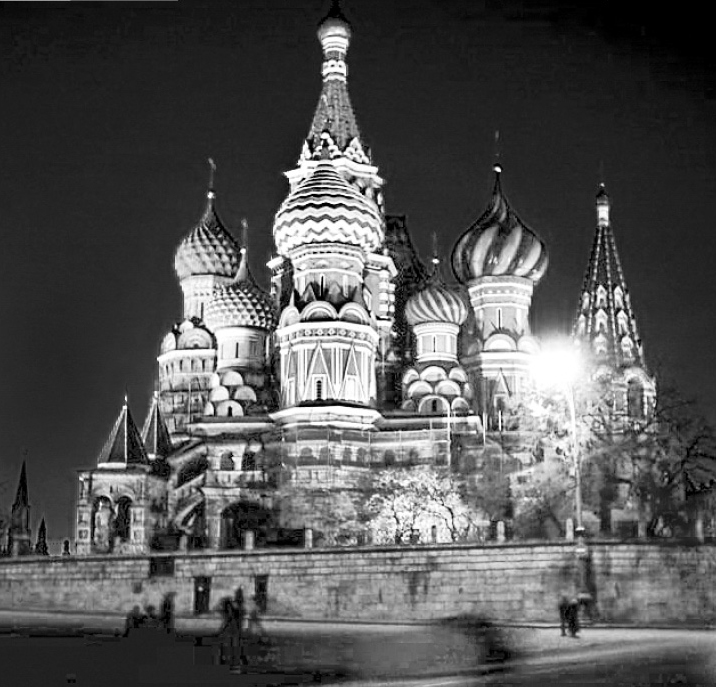Russia Fortitude

Kremlin, Red Square, Moscow, Russia.
“Delete the picture right now.”
I am standing in the middle of St. Petersburg and a pimp is shouting at me. I have stumbled across an unlikely, eye-catching scene: a line of scantily clad girls being paraded through the city. Out of instinct, I photographed it. Now the camera is being grabbed out of my hands. Any thought of protest is quelled when another bulky man steps into view. I am shaking and not because of the cold. These people are not messing around. The picture is gone but I have learned, in my own small way, the big lesson about Russia: it is a harsh, unforgiving place, and the only way to survive is with fortitude.
Most Russians will have their own personal and family story of fortitude, the experience of living through struggle. In Russia, fortitude is not merely a value, it is a way of life: strength is power, but also a necessary component of survival. And, whatever your view on Russian politics and foreign policy, when you are in the country it is hard not to admire the iron resolve of its people. In Russia, hard times mean not that you consider giving in, but that you dig even deeper into the reservoir of fortitude and self-preservation.
People wear their fortitude as a badge of honor, almost a sign of nationhood. My host Olga told me how her mother, a university professor, for nine months after the collapse of the Soviet Union, when the system broke down and nobody in academia was paid, would do a day’s work and then go over the border to sell Russian goods for money (while also picking up products she could make a profit on back home). For her troubles, she would be tailed by the mafia.
Such harshness has bred its own culture, one in which fortitude is both held close and brandished aloft. Displays of military strength accordingly have a central place in Russian culture. The annual May 9 Victory Day commemorations, celebrating the end of World War II and victory over Nazi Germany, have become one of the most important annual holidays in Russia, with military parades held nationwide. The seventieth anniversary event in 2015 saw over sixteen thousand soldiers marching through Moscow.
Tales of past victories, especially those that symbolize great fortitude, also have a prominent place in the collective memory. Dom Pavlova, an apartment block that held out for sixty days in the face of the German onslaught, symbolizes the defiance of the Battle of Stalingrad. The Soviet commander at Stalingrad, Vasily Chuikov, is said to have boasted that the Germans lost more men trying to take this one building than they had taking the entire city of Paris. This is the meat and drink of Russian folklore: strength and struggle in the face of the outsider and the invader.
The same spirit is still celebrated today; in early 2018, a Russian pilot shot down in Syria blew himself up with a grenade to avoid capture, with the reported last words, “This is for our guys.” The story was lapped up by the Kremlin and Russian media as a classic example of Russian fortitude in the face of peril.
Today, the hardship faced by many ordinary Russians is the product of economic sanctions rather than military action. The asset freezes and trade restrictions imposed by the EU and U.S. following Russia’s 2014 invasion and annexation of Crimea have sent the economy into deep recession, and the numbers living in poverty close to 20 million (a significant spike, though still half of what it was in 2000).
Yet talk to Russians about their current plight, and you will get a mostly defiant response. “We don’t need to eat,” one told me. “It feeds us to know that we are being feared.” As a foreigner, you are constantly being asked about the view from outside: what are they saying about us? There is always something of the siege mentality.
We may not experience extreme hardship in our lives, but that does not mean we cannot find inspiration from Russian fortitude. On a relative scale, we will also experience difficulties and setbacks. We will all have to find a way to battle the odds. At this point, so much depends on your inner core of fortitude: something that gives you the will, the confidence, and the determination to keep going and ultimately achieve your goals. Without that fortitude, even the best ideas, the best-positioned careers, and the most capable people will ultimately falter. We all need a little Russian fortitude in us to pull through the hard times and succeed.